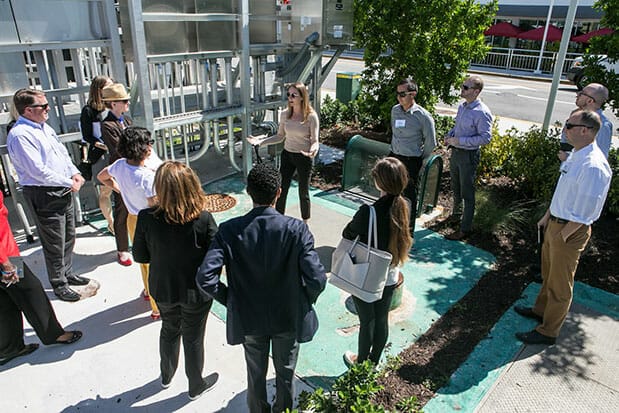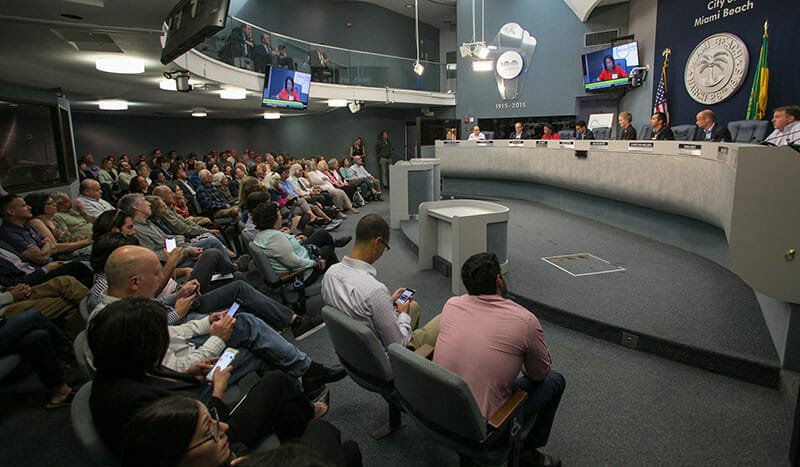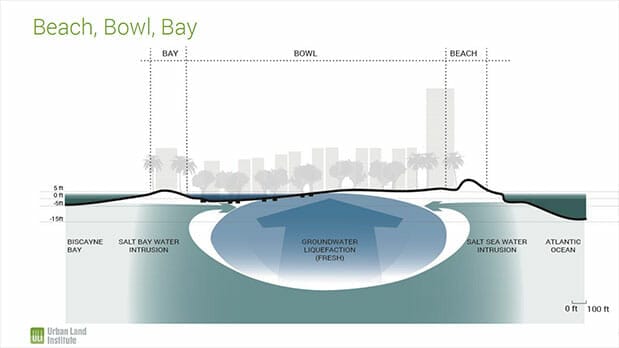Top Story
Date: April 16-19, 2018
Location: City of Miami Beach
Sponsor: City of Miami
Subject Area: Stormwater Management, Climate Adaptation, and Resilience
Panel Chair: Joyce Coffee, founder and president, Climate Resilience Consulting
 Panelists tour a pumping station in the city of Miami Beach (Korey Davis/ULI)
Panelists tour a pumping station in the city of Miami Beach (Korey Davis/ULI)
Background and Panel Assignment
With the support of the Rockefeller Foundation’s 100 Resilient Cities initiative, a team of ULI Advisory Services Panelists traveled to the city of Miami Beach to provide expert advice on its preparations for sea level rise and provide an assessment of the current $600 million stormwater management program.
Since 2013, the City has taken sweeping efforts to protect its investments from the effects of climate change. Miami Beach is approximately 15% into a 10-year, multi-year stormwater management program that addresses both infrastructure and land use and development codes. This stormwater management plan includes improving drainage systems, elevating roads, installing pumps to replace aging stormwater pipes, replacing much of the city’s water, wastewater, and utilities systems, and updating regulations to reflect increased elevation requirements, seawall barriers, and more.
The panel was tasked with determining whether these efforts are appropriate and identifying opportunities for improvement.
Miami Beach faces several obstacles to enhancing the resilience of the city against sea level rise and coastal erosion, including complex geology and stormwater and high-tide events that both degrade the structural integrity of the City’s infrastructure and frequently causes extreme flooding. The City’s historic districts also provide pressure to the issue given the preservation designations and the cost of elevating historic structures. The majority of its historic districts, which account for 44% of City revenue streams and drive tourism, are located within low elevation zones and are costly to adapt to sea level rise and flooding risks. Further, there is not consensus about the city’s approach among local stakeholders and residents and local media have been extremely vocal about the City’s efforts.
 ULI panelists present their recommendations to the city of Miami Beach, Florida. (Korey Davis/ULI)
ULI panelists present their recommendations to the city of Miami Beach, Florida. (Korey Davis/ULI)
Key Recommendations and Takeaways
ULI Panelists provided recommendations about how to take a more holistic approach beyond the current stormwater strategy, considering upgrades to hard infrastructure, opportunities for green and blue infrastructure, regulatory opportunities, finance, , and communications strategy for engaging the public. The panel applauded several aspects of Miami’s Beach’s efforts including aspects of its:
- Local capital improvement programs. In its initial efforts, the city created a sequencing chart that laid out a detailed CIP by neighborhood and funding timeline.
- Coordination among infrastructure projects. The City raised roads in compromised, highly trafficked neighborhoods like Sunset Harbour, West Avenue and the Flamingo Historic District, while installing and upgrading stormwater pumps to more effectively manage outflow in stormwater events.
- Water management system. The City enhanced its disposal process to ensure high water quality and incorporated green infrastructure to further mitigate against the effects of sea level rise while also enhancing the community.
- Financing strategy. The stormwater program has not relied on state or federal funds. The City financed most of these efforts by selling off $100 million bonds earmarked for capital improvements, coupled with public funds derived from Miami Beach’s substantial tax coffers.
- Communications plan. The City’s communication plan for its resilience work, including the stormwater plan and more, includes a branded Rising Above website, a social media campaign, and extensive community outreach to local organizations.
The panelists concluded that Miami Beach has made an admirable start but needs to take a more comprehensive approach given the extensive climate risk faced by the city. The panel’s final presentation recommended an integrated solution that incorporates the physical design and typology, creative placemaking strategies, financing opportunities that include public, private, and risk transfer solutions, updated regulations and governance structures, and suggestions to enhance the City’s communication strategy. Recommendations included:
- Embracing a comprehensive vision to better “living with water”. The panel noted that there are opportunities to improve on the city’s efforts in a manner that better integrates key principles to combat sea level rise.
- Employing innovative solutions for green infrastructure that offer a more sustainable storm and groundwater management solution. This approach would alleviate the City’s current pump system, which is costly to install, operate, and maintain, as well as introduce many other benefits related to quality of life, placemaking and public open space.
 The illustration of the basin or “bowl” depicts the unique challenges Miami Beach faces with saltwater intrusion adding pressure to groundwater (ULI)
The illustration of the basin or “bowl” depicts the unique challenges Miami Beach faces with saltwater intrusion adding pressure to groundwater (ULI)
- Establishing a Miami Beach ‘Rising Above’ Delivery Office to improve governance and regulation frameworks. In order to adopt new resilience models to deliver data-driven transparency, the panel recommended creating a designated Rising Above Delivery office to monitor and communicate effectiveness of the stormwater and resilience programs, offer tools, project performance, community outreach, and facilitate creative placemaking. The panel also recommended creating task forces to address specific risk factors associated with their resilience plan, along with a scientific advisory board that can continuously evaluate the city’s strategy.
- Highlighting resilience efforts to attract new capital. The panel explored options for financing future resilience improvements and encouraged the city to take a holistic view of finance that recognizes the role stormwater management and climate adaptation plays in the pricing of insurance premiums. This ensures a stable tax base and good credit rating, so the City is able to deliver the stormwater management infrastructure Miami Beach needs to adapt to climate change. The panel also urged the city to be open about both the risks faced and investments in mitigation, given the investment community’s awareness of climate risk. The panel also recommended implementing special assessment districts and insurance pools to make the City less reliant on the National Flood Insurance Program. The panel also encouraged Miami Beach to consider insurance as a form of risk transfer that can play an appropriate role in reducing the burden on taxpayers by offloading the balance sheet risk of implementing large resilience projects.
- Revisiting historic preservation ordinances and other regulations and prioritizing significant assets that are the most at risk. The panel emphasized the critical importance of Miami Beach’s heritage and historic building structures, considering their important contributions to sense of place, economic development and tourism. However, the panel urged the city to revisit the current approach to historic preservation to consider climate risk and prioritize saving the assets that are most at risk. For example, the panel strongly encouraged the City to involve experienced development and climate change professionals in its historic preservation and development review boards to keep water management top of mind. As the city better understands the risk faced, panelists recommended taking an approach that prioritizes the most important historic landmarks. centralize the raising of private seawalls and private properties, and a reform of the City’s stormwater fee structure.
- Enhancing the City’s communication strategy. Implementing a broader and more holistic stormwater management strategy would require enhanced communications with the community at large, especially as it requires increased taxation and regulations to bring to fruition. The panelists also recommended that the City not shy away from branding as a resilient city to highlight innovative efforts and to attract capital. Miami Beach has the opportunity to be a leader in the field of resilience given its already-underway and future efforts to address the impacts of climate change.